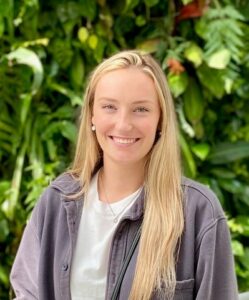Congratulations to the Master’s graduates of the Graduate Program in Neuroscience (GPN), fall class of 2023! Twelve trainees are graduating this week and to celebrate, we asked them for some of their favourite memories during their time at UBC, future plans and advice for future students.
Juana Ayala Castaneda, MSc
 Supervisor: Dr. Miriam Spering
Supervisor: Dr. Miriam Spering
Thesis title: Eye movements, trait impulsivity, and hypomania proneness in healthy young adults.
Summary of research: This study focused on using eye movement metrics to investigate the relationship between impulse control and hypomania proneness. We aimed to provide evidence to distinguish whether impulsivity has a trait or state relationship with hypomania by testing healthy adults and assessing hypomania proneness. We found that eye movement metrics modestly align to different behavioural measures of impulsivity in the bipolar disorder literature.
Future plans: To keep learning about the brain.
Advice for future students: Just remember that everything will be fine, focus on making the most of your grad school experience whatever that looks like for you and your goals.
Samantha Blankers, MSc
 Supervisor: Dr. Liisa Galea
Supervisor: Dr. Liisa Galea
Thesis title: Sex and genotype influence neural stem cells in a model of sporadic Alzheimer’s disease.
Summary of research: The major non-modifiable risk factors for sporadic Alzheimer’s disease are advancing age, female biological sex, and at least one apolipoprotein E (APOE)4 allele. Using adult male and female mice expressing APOEε3 or APOEε4 alleles, we studied neurogenesis by “time-stamping” new cells as they divided. We found that hAPOEε4 females had differences in the abundance and lifecycle of neural stem cells, which are cells that are destined to be neurons but have not yet fully specialized.
Advice for future students: Make the most of your experience at UBC, take advantage of free career workshops, journal clubs, and anything else that sparks your interest! The responsibility of a large-scale project can be daunting at first, but you will get it done so try your best to relax and enjoy the process.
Future plans: To work in the field of science communication, bridging the gap between researchers and the public using visual art and scientific writing.
Fermin Hoq, MSc
 Supervisor: Dr. Manon Ranger
Supervisor: Dr. Manon Ranger
Thesis title: Short-term effects of repeated neonatal oral sucrose treatment and pain on hippocampal and serum inflammatory cytokine levels and microglia density in mouse pups.
Summary of research: Premature infants receive several minor yet painful procedures daily, which are managed using sweet-tasting solutions (ex. Sucrose). However, little is known about the safety of sucrose in combination with pain. I investigated the effects of early-life sucrose treatment for pain on inflammatory markers in the brain and blood of mouse pups. I found that several inflammatory markers were altered in mouse pups exposed to sucrose and/or pain, which supports the idea that using sweet-tasting solutions (like sucrose) for pain management could be associated with harmful outcomes.
Advice for future students: Enjoy every moment of your graduate studies with your colleagues and peers – it will come to an end before you know it. And start writing your thesis early!!!!
Leah Kuzmuk, MSc
 Supervisor: Dr. Miriam Spering
Supervisor: Dr. Miriam Spering
Thesis title: Exploring the antisaccade task in relation to motor and cognitive functions in adults with mild to moderate idiopathic Parkinson’s Disease.
Summary of research: It is now accepted that in addition to impaired movement, Parkinson’s Disease (PD) patients experience a range of non-motor symptoms affecting sensory and cognitive domains. My research investigated how eye movements can be used as a tool to probe cognitive and motor changes beyond what is detected on standard clinical and neuropsychological assessments. Early changes in eye movement features may aid in earlier detection and intervention for individuals living with PD.
Favourite GPN memory: Starting the DMCBH summer and fall run clubs!
Future plans: I am thrilled to have joined the team at AbCellera shortly after defending my thesis. AbCellera is a Vancouver based antibody discovery and development company that started out of Dr. Carl Hansen’s lab at UBC. I am working in the partnering team in Alliance management which has been the perfect combination of my scientific and business interests.
Megan Liu, MSc
 Supervisor: Dr. Kiran Soma
Supervisor: Dr. Kiran Soma
Thesis title: Effect of calorie restriction on motivation to exercise and the steroid profile of female rats.
Summary of research: We designed a simple, specific, and effective operant task for assessing the motivation to exercise in rats. We validated this task in female rats by showing that calorie restriction increases both wheel running performance and the motivation to run. We also measured steroid hormone levels in regions of the mesocorticolimbic system and found that sex steroids such as testosterone may play a role in modulating the motivation to exercise in female rats.
Favourite GPN memory: Participating in events and activities that helped promote and foster the neuroscience community at UBC! My role as both First Year Representative and VP Finance of the Neuroscience Trainee Association was also a really rewarding experience that allowed me to help organize social events and connect with other GPN students.
Advice for future students: Make the most out of your time and the opportunities available to you as a research trainee. Go to social events; get involved in your community and get to know your peers. You never know what you can learn from each other, and leaning on mutually supportive relationships is invaluable during the lows of research.
Karling Luciani, MSc
 Supervisor: Dr. Christian Schütz
Supervisor: Dr. Christian Schütz
Thesis title: Augmentation of cognitive control with theta burst stimulation of the right ventrolateral prefrontal cortex: first steps towards a novel therapeutic approach to improve bipolar disorder outcome.
Summary of research: Bipolar disorder affects more than 1% of the population and causes deficits in response inhibition. The right Inferior Frontal Gyrus (rIFG) is a potential target in the brain for augmentation of response inhibition. The current study investigated response inhibition in bipolar disorder following transcranial magnetic stimulation (TMS). Results showed the response inhibition sub-component ‘action withholding’ was significantly improved following TMS. The study provides insights for further development and research of TMS over the rIFG in bipolar disorder.
Future plans: To become a scientist-practitioner in the field of clinical neuropsychology, specializing in mental health disorders.
Advice for future students: Research what you are passionate about, but don’t forget to also prioritize your mental health! Graduate school can be demanding, surround yourself with a supportive network of peers, mentors, and friends. Don’t hesitate to reach out for support when you need it.
Allison Mella, MSc
 Supervisor: Dr. Alexander Weber
Supervisor: Dr. Alexander Weber
Thesis title: Temporal complexity alterations of resting state fMRI in preterm versus term born infants.
Summary of research: When birth occurs before 37 weeks neurodevelopmental trajectories are interrupted, we investigated the Hurst exponent as a measure of temporal complexity of resting state-fMRI signaling in comparing preterm infants to term born infants. The results of this study suggest that in preterm birth as early as 23 weeks gestational age, the Hurst exponent values can be used to index developmentally relevant differences in BOLD-signal temporal complexity and reflect functional growth processes in the neonatal brain.
Advice for future students: Take advantage of all workshops and seminars to learn new research skills. Make sure you have work life balance such as weekends off and having a great support system. It will be all worth it in the end!
Hallee Shearer, MSc
 Supervisor: Dr. Tamara Vanderwal
Supervisor: Dr. Tamara Vanderwal
Thesis title: Movie-fMRI as an acquisition state for functional connectivity based precision psychiatry.
Summary of research: Movie fMRI is the idea of showing people movies while they lay in the brain scanner. The field of precision psychiatry uses functional MRI scans to try to tailor psychiatric diagnosis, treatment, and prognosis to each individual patient. However, these endeavours are being hindered by poor data quality. I looked at whether movie fMRI could provide necessary improvements to data quality and quantity needed for precision psychiatry.
Favourite GPN memory: Brainstorming sessions in the lab. Whether it was a lab meeting with everyone floating around new ideas, or talking about niche interests with my fellow grad student in the lab (Ahmad Samara), I truly enjoyed being around such brilliant and curious people.
Advice for future students: I’m really excited to have the opportunity to continue to explore the field of precision psychiatry as a research technician in Boston with Dr. Stephanie Noble in December. Then, I’d like to pursue a PhD in Neuroscience within the next couple of years.
Yuexiaoxi (Cecilia) Yu, MSc
 Supervisor: Dr. Trisha Chakrabarty and Dr. Rebecca Todd
Supervisor: Dr. Trisha Chakrabarty and Dr. Rebecca Todd
Thesis title: Parsing out anticipatory and consummatory reward underlying anhedonia in mood disorders.
Summary of research: I used EEG to study the electrophysiological responses at different stages of reward anticipation and reward consumption in a monetary incentive delay paradigm. By characterizing event-related potentials (ERPs), we found the paradigm was able to elicit greater responses in higher reward magnitudes in early reward anticipation. The paradigm could serve as a tool to examine anhedonia, especially changes in anticipatory reward processing, in individuals with depression and other psychiatric disorders characterized by anhedonia.
Favourite GPN memory: Having the opportunity to work with a multidisciplinary group and collaborating with researchers and clinicians with different areas of expertise. Also, attending to various weekly/monthly seminars to learn about other labs works which might be totally different from my research, but they are fantastic opportunities to explore the diverse topics in neuroscience.
Future plans: I’m continuing my Ph.D. in GPN working with Dr. Noah Silverberg to study functional cognitive disorders.
Juliane Coutts, MSc
Supervisor: Dr. Neil Cashman and Dr. Jason Snyder
Thesis title: Anti-amyloid-beta oligomer antibody increases the survival of newborn hippocampal neurons.
Daria Oleinichenko, MSc
Supervisor: Dr. Terrance Snutch and Dr. Anthony Phillips
Thesis title: Behavioural effects of novel clinical candidate drugs, l-tetrahydropalmatine (l-THP) and Z944, on morphine withdrawal-induced hyperalgesia.
Long Zuo, MSc
Supervisor: Dr. Ann Marie Craig
Thesis title: Modulating neurexin-1 boosts glutamatergic transmission.


